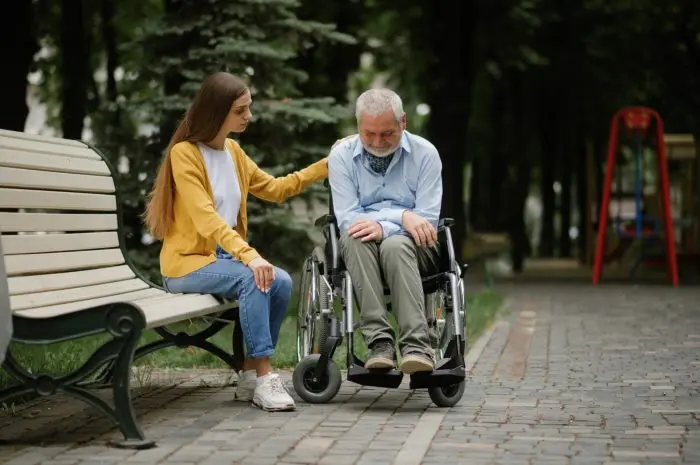Adapting to life after a stroke is a significant and often challenging journey, both for the survivors and their loved ones. Stroke survivors may face physical, emotional, and cognitive changes that require adaptation to a new way of life.
However, with determination, support, and the right strategies, it is possible to regain independence, improve quality of life, and find a sense of purpose post-stroke. In this comprehensive guide, we will explore the various aspects of adapting to life after a stroke.
Understanding Stroke:
A stroke occurs when there is a disruption in the blood supply to the brain, leading to brain cell damage. It can result from a blocked blood vessel (ischemic stroke) or a burst blood vessel (hemorrhagic stroke). The severity and consequences of a stroke depend on its location and extent.
Physical Rehabilitation:
After a stroke, physical rehabilitation is often a crucial component of the recovery process. Rehabilitation programs may include physical therapy, occupational therapy, and speech therapy, tailored to address specific physical and cognitive challenges:
Physical Therapy
Helps stroke survivors regain strength, balance, and mobility. Exercises and techniques are designed to improve motor skills, reduce muscle stiffness, and enhance coordination.
Occupational Therapy
Focuses on regaining the ability to perform daily activities such as dressing, eating, and bathing independently. Occupational therapists provide adaptive strategies and tools to make daily life more manageable.
Speech Therapy
Stroke survivors with communication difficulties or swallowing problems may benefit from speech therapy to regain language skills and address swallowing issues.
Emotional and Psychological Support:
The emotional impact of a stroke can be profound for both survivors and their loved ones. Depression, anxiety, and feelings of loss and frustration are common. It is essential to seek emotional and psychological support:
Counseling and Therapy
Individual or group therapy sessions with a mental health professional can help stroke survivors and their families cope with the emotional challenges that may arise.
Support Groups
Joining a stroke support group can provide a sense of belonging, as well as valuable insights and advice from others who have gone through similar experiences.
Cognitive Rehabilitation:
Stroke survivors may experience cognitive changes, such as memory problems, difficulty with attention and concentration, and language impairments. Cognitive rehabilitation, which may include cognitive therapy and memory training, can help improve cognitive functioning and restore independence in daily activities.
Adaptive Devices and Home Modifications:
Adaptive devices and home modifications can make daily life more manageable for stroke survivors. These may include mobility aids like canes or wheelchairs, grab bars and handrails in the bathroom, and ramps for easier access to the home. These adaptations enhance safety and independence.
Medication Management:
Many stroke survivors require ongoing medication management to control risk factors such as high blood pressure, high cholesterol, and blood-thinning medications to prevent recurrent strokes. It is essential to adhere to the prescribed medication regimen and attend regular medical check-ups.
Lifestyle Changes:
Adopting a healthy lifestyle can reduce the risk of recurrent strokes and improve overall well-being:
- Diet: A heart-healthy diet rich in fruits, vegetables, whole grains, lean proteins, and low in saturated fats and salt is essential for stroke prevention and recovery.
- Exercise: Physical activity, as recommended by healthcare professionals, can improve cardiovascular health and enhance mobility. Regular exercise is an integral part of stroke recovery.
- Smoking Cessation: Quitting smoking reduces the risk of recurrent strokes and improves overall health.
- Alcohol Moderation: Limiting alcohol consumption is crucial, as excessive alcohol intake can increase the risk of stroke.
Independence and Quality of Life:
Regaining independence and quality of life is a primary goal for stroke survivors. It involves adapting to new challenges and learning to work around limitations:
- Assistive Technology: Utilizing assistive technology and devices like speech-to-text software, adaptive computer tools, and mobility aids can facilitate independence.
- Setting Realistic Goals: Establishing achievable goals, both short-term and long-term, can provide motivation and a sense of accomplishment. It’s essential to celebrate small victories along the way.
- Maintaining Social Connections: Staying socially connected with friends and family can help combat feelings of isolation and promote emotional well-being.
- Exploring Hobbies and Interests: Engaging in hobbies and interests that are meaningful and enjoyable can improve mood and provide a sense of purpose.
Financial and Legal Considerations
Stroke survivors and their families may need to address financial and legal matters, such as medical expenses, insurance claims, and estate planning. Consulting with financial advisors and legal professionals can help navigate these complex issues.
Long-Term Care Planning
For those with severe disabilities, long-term care planning may be necessary. Options may include home healthcare services, assisted living facilities, or nursing homes. It’s essential to discuss long-term care preferences with loved ones and create a plan accordingly.
Resilience and Hope
The journey of adapting to life after a stroke can be challenging, but it is essential to maintain a sense of resilience and hope. With time, support, and determination, many stroke survivors make remarkable recoveries and lead fulfilling lives.
In conclusion, adapting to life after a stroke is a multifaceted process that encompasses physical, emotional, and psychological aspects. It involves rehabilitation, emotional support, lifestyle changes, and various strategies to regain independence and improve quality of life.
Each stroke survivor’s journey is unique, and it’s crucial to approach it with patience, determination, and a strong support system. Remember that progress may be gradual, but with dedication and the right resources, positive outcomes can be achieved.










